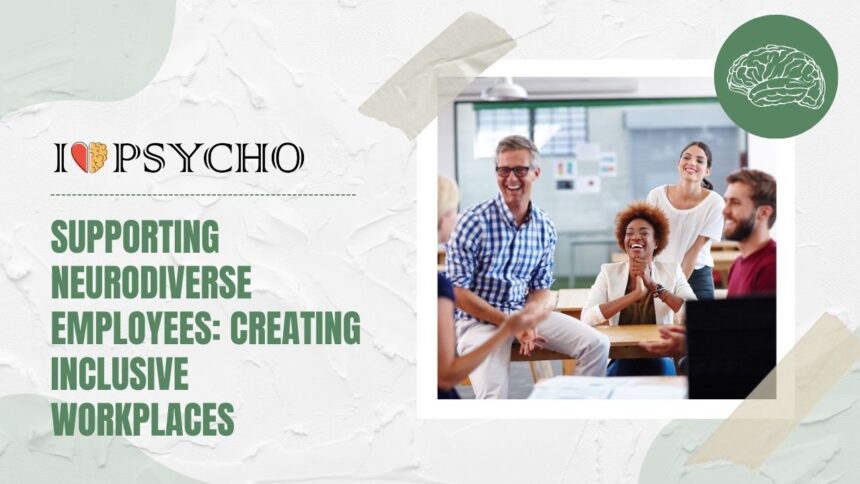Welcome to a world where diversity is celebrated, and inclusion is the key to success. In today’s fast-paced workplaces, embracing neurodiversity has become more important than ever. From unique perspectives to innovative ideas, neurodiverse employees bring a wealth of talent and creativity to the table. Join us as we explore how creating inclusive workplaces can unlock the full potential of all individuals, regardless of their neurological differences. Let’s dive in and discover how supporting neurodiverse employees benefits not only them but the entire organization.
What is Neurodiversity?
Neurodiversity is a concept that recognizes and celebrates the natural variations in how individuals think, learn, and process information. It encompasses a range of neurological differences, including autism, ADHD, dyslexia, and more. Rather than viewing these differences as deficits to be fixed, neurodiversity emphasizes the value of diverse cognitive styles.
Each person’s brain functions uniquely, shaping their perspectives and abilities in distinct ways. Neurodiverse individuals may excel in areas where others struggle and vice versa. This diversity enriches our society by bringing fresh insights and solutions to complex problems.
By embracing neurodiversity, we move away from conformity towards true inclusion. It’s about creating environments where every individual feels valued for their unique strengths rather than judged for their differences. Ultimately, neurodiversity challenges us to broaden our understanding of what it means to be successful in today’s world.
The Importance of Creating Inclusive Workplaces
Creating inclusive workplaces is not just a trend – it’s a necessity in today’s diverse society. Companies that embrace neurodiversity and make efforts to accommodate all employees find themselves with a more engaged, productive, and innovative workforce. When employees feel valued and supported for who they are, regardless of their neurodiversity, they can bring their unique skills and perspectives to the table.
Inclusive workplaces foster creativity and problem-solving by encouraging different ways of thinking. By embracing neurodiversity, companies can tap into a pool of talent that may have been overlooked in the past. This not only benefits individual employees but also contributes to the overall success of the organization.
When employers prioritize inclusivity, they create a positive work environment where every employee feels respected and empowered to thrive. This leads to increased job satisfaction, higher retention rates, and ultimately better business outcomes. Embracing neurodiversity isn’t just about meeting legal requirements – it’s about creating a culture of acceptance and understanding where everyone has an opportunity to succeed.
Tips for Employers to Create a More Inclusive Workplace
Creating a more inclusive workplace for neurodiverse employees starts with education. Employers should take the time to learn about different neurodivergent conditions and how they can impact individuals in the workplace. Providing training for all staff on neurodiversity awareness can help foster understanding and empathy.
Flexibility is key when accommodating neurodiverse employees. Offering flexible work hours, remote work options, or personalized workspace arrangements can greatly benefit those who may struggle with traditional office settings. Communication is vital – making sure to have open lines of communication with neurodiverse employees helps in addressing any challenges they may face.
Providing clear instructions and breaking down tasks into smaller steps can aid in boosting productivity and confidence among neurodiverse employees. Creating a supportive environment where feedback is constructive and ongoing allows for continuous improvement and growth within the team dynamic.
Implementing mentorship programs or pairing neurodiverse employees with colleagues who can offer guidance and support fosters a sense of belonging and community within the workplace. Encouraging an atmosphere of respect, acceptance, and diversity ultimately leads to a more inclusive and harmonious work environment for all individuals involved.
Challenges Faced by Neurodiverse Employees in the Workplace
Navigating the workplace can present unique challenges for neurodiverse employees. The fast-paced environment, social interactions, and sensory stimuli can be overwhelming for some.
Misunderstandings in communication or difficulties in expressing thoughts may lead to feelings of isolation or frustration. Additionally, rigid structures and routines can pose obstacles for those who thrive in more flexible settings.
Sensory sensitivities like noise levels or bright lighting can also impact focus and productivity. These challenges might not always be visible but can significantly affect job performance and well-being.
Furthermore, neurodiverse individuals may struggle with executive functioning skills such as time management or organization, which could hinder their ability to meet deadlines or prioritize tasks effectively.
Creating awareness around these challenges is crucial in fostering a more understanding and supportive work environment for all employees.
Strategies for Creating an Inclusive Workplace for Neurodiverse Employees
Creating an inclusive workplace for neurodiverse employees requires a tailored approach. Begin by offering training to all staff on neurodiversity and how to support colleagues with diverse needs. Encourage open communication and provide flexibility in work arrangements to accommodate individual preferences.
Implementing clear communication channels and providing visual aids can enhance understanding for neurodiverse employees. Consider creating mentorship programs or assigning workplace buddies to offer additional support. Foster a culture of acceptance and celebrate the unique strengths that each employee brings to the team.
Offering sensory-friendly spaces, noise-canceling headphones, or designated quiet areas can help create a more comfortable environment. Providing clear expectations, breaking down tasks into manageable steps, and utilizing assistive technologies are also effective strategies.
Regular check-ins with neurodiverse employees can help identify any challenges they may be facing, allowing for timely adjustments to be made. By incorporating these strategies into the workplace culture, organizations can truly embrace diversity and create a supportive environment for all employees.
Case Studies: Companies with Successful Inclusive Practices
Let’s take a look at some companies leading the way in creating inclusive workplaces for neurodiverse employees:
Company A, a tech firm based in Silicon Valley, has implemented a mentorship program matching neurodiverse employees with experienced colleagues. This initiative has improved retention rates and fostered a sense of belonging within the company.
Company B, a retail giant, offers flexible work arrangements to accommodate the needs of neurodiverse employees. By allowing remote work options and personalized schedules, they have seen an increase in productivity and job satisfaction among their diverse workforce.
Company C, an advertising agency, provides ongoing training sessions on neurodiversity awareness for all staff members. This proactive approach has enhanced communication and collaboration across teams while reducing misunderstandings and conflicts.
These case studies highlight the positive impact of embracing neurodiversity in the workplace. By adopting tailored strategies and fostering a culture of acceptance, these companies are setting exemplary standards for inclusivity in today’s corporate world.
Resources and Support for Employers and Employees
Resources and support for employers and employees in creating inclusive workplaces are essential. Employers can benefit from training programs that educate them on neurodiversity and how to accommodate diverse needs effectively. Organizations like the Job Accommodation Network (JAN) offer guidance on workplace accommodations for neurodiverse individuals, ensuring they can thrive in their roles.
Employers can also seek assistance from disability consultants or diversity experts to tailor their policies and practices towards inclusivity. Providing access to mentorship programs, employee resource groups, and mental health resources can foster a supportive environment for neurodiverse employees.
For employees, seeking out peer support groups or online forums specific to neurodiversity can provide a sense of community and empowerment. Mental health services, such as counseling or therapy sessions, may also be beneficial in navigating workplace challenges.
By leveraging these resources and supports, employers and employees alike can work together to create environments where everyone feels valued and respected.
Conclusion: Embracing Neurodiversity Benefits Everyone
Embracing neurodiversity in the workplace benefits everyone involved. By creating inclusive environments, employers not only support their neurodiverse employees but also foster a culture of diversity and innovation. When individuals with different perspectives and strengths are valued and included, companies see increased creativity, productivity, and employee satisfaction.
As we continue to strive for equality and acceptance in all aspects of society, it is crucial that workplaces become more accommodating to the diverse needs of their employees. By implementing strategies to support neurodiverse individuals, businesses can tap into a pool of talent that brings unique skills and viewpoints to the table.
Embracing neurodiversity is not just about meeting legal requirements or being politically correct; it’s about recognizing the value that each individual brings to the team. When organizations prioritize inclusion and create supportive environments for all employees, they pave the way for success not only for their business but also for society as a whole.









